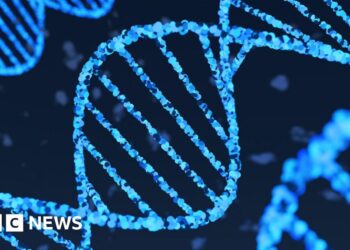
Understanding how losing the Y chromosome affects treatment outcomes in lung cancer could guide therapy decisions
da-kuk/Getty Images
Men with the most common form of lung cancer seem to be uniquely susceptible to losing the Y chromosome from their cells, which could have advantages and disadvantages. On the one hand, it shields their tumours from being destroyed by the immune system, but on the plus side, it boosts the effectiveness of a commonly used cancer drug.
As men age, many of their cells are prone to mutating and losing their Y chromosomes. With immune cells, this has been linked to heart disease and a shorter lifespan. Evidence is also accumulating that cancerous cells shedding their Y chromosomes affects the condition’s progression, with bladder cancers being the best-studied example.
For a cell, loss of Y is a binary event: it either happens or it doesn’t. But what seems to be important for health outcomes is the fraction of cells of a particular type that lack a Y chromosome.
The latest research began with Dawn DeMeo at Brigham and Women’s Hospital in Boston, Massachusetts, and her colleagues analysing the expression levels of Y chromosome genes in a public database of samples of lung adenocarcinoma, the most common type of lung cancer, which starts in the mucus-making cells lining the airways. Emerging links between loss of Y and various conditions compelled the researchers to assess this in more detail via gene expression studies, says DeMeo.
They found that the cancerous cells frequently lacked Y chromosomes, unlike heathy lung cells and immune cells. This occurred regardless of whether or not the tissue donors smoked, a behaviour known to cause lung cancer and induce loss of Y.
The loss of Y also accumulated. “There is a group of people who lose more and more Y chromosomes in more and more cells, so a greater proportion of the tumour exhibits loss of Y,” says team member John Quackenbush at Harvard University.
To uncover why this accumulation occurs, the team examined other genetic changes in cells without Y. This linked the loss to the reduced expression of a common set of antigens that cancer cells often make, which ordinarily signal to immune system cells called T-cells that these cancer cells are abnormal and should be attacked. This reduced expression then enables the Y-less cancer cells to proliferate unchecked.
“What that suggests is that as the tumour cells lose their Y chromosomes, they’re increasingly able to evade immune surveillance, and that would argue that they’re selected for,” says Quackenbush. T-cells were consistently less common in samples characterised by loss of Y than in Y-retaining tumours.
The more positive news came when the researchers looked at data from 832 people with lung adenocarcinoma who had been treated with the immune checkpoint inhibitor pembrolizumab, a drug that reinvigorates a person’s natural immune response to tumours by reversing T-cell suppression. They saw that loss of Y was associated with better treatment outcomes.
“When you have LOY [loss of Y], you’re more responsive to checkpoint inhibitors,” says Dan Theodorescu at the University of Arizona, who uncovered the same outcome in bladder cancer in 2023. “It’s validated here in a completely different dataset.”
However, despite loss of Y being linked to men having a shorter lifespan than women, existing data suggests it doesn’t affect survival in people with lung adenocarcinoma. Research needs to uncover how the actions of such mutations and their survival effects vary between cancer types, says Theodorescu. With this better understanding, loss of Y could one day be used as a biomarker to inform clinical decision-making, he says.
Topics:
Source link : https://www.newscientist.com/article/2505035-vanishing-y-chromosomes-could-aid-or-worsen-lung-cancer-outcomes/?utm_campaign=RSS%7CNSNS&utm_source=NSNS&utm_medium=RSS&utm_content=home
Author :
Publish date : 2025-11-20 09:00:00
Copyright for syndicated content belongs to the linked Source.










